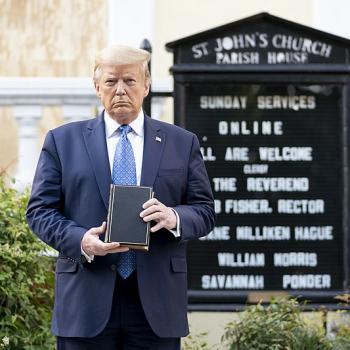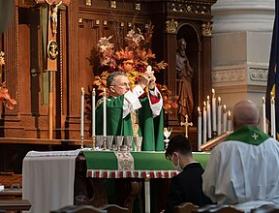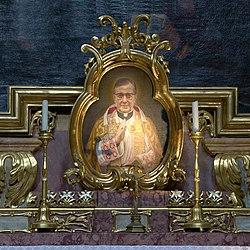Her sins–and they are many–have been forgiven, so she has loved much. But a person who is forgiven little shows only little love. Luke 7:47
Dorothy Day sets off controversy, even after her death.
She followed Christ as He called her, often to the discomfort and dismay of other Christians who sought a less radical Way. Does that sound familiar? If you spend much time reading biographies of the saints, it should.
The saints weren’t often people’s people. They were too busy being God’s people. The saints are also often converted sinners who had fallen into the muck and mire of their times and taken a good bath there. It seems that God often makes His saints from the worst sinners. It’s as if He can do the most with these edgy people from the pits of life; people who know that evil is real and who see by contrast that God and His love are the only solution to the evil they have known.
Dorothy Day was a converted sinner. She took her turn at living life in the fast lane of the early 20th Century. She ran with the crowd and followed its ways up to and including having an abortion. Then, as people have been doing for 2,000 years, she found Jesus, or, I would imagine, she let Him find her. And that made all the difference.
Dorothy Day lived her life for Christ after that. She founded a ministry to the poor called Catholic Worker Houses. She published a great deal in support of this ministry and did not step back from the requirement of living alongside the people she was trying to help.
Her wary attitude towards government and stubborn pacifism did not always sit well with people in the depression-ridden, war-bound years of the 1930s and 40s. It found even less support during the Cold War years that followed. I suspect Dorothy Day seemed an embarrassment, an unrealistic fanatic, to a good many of the good, church-going people of her day.
It is only now that she begins to make sense. Corporatism is beginning to take a deep toll on the lives of Americans. We have morphed into a country that is continuously at war with an ever-changing cast of enemies. The over-weaning power of government has begun to focus on active legal persecution of the Church itself. These are our times. It appears that Dorothy Day, the uncomfortable convert, is beginning to seem less like a nutty fanatic and more like a prophet for our days.
It is in that prophetic role that she continues to set off controversy. Her life is a flashpoint of disagreement for a lot of people today, just as it was in the past. Some people try to cast Dorothy Day as “their” saint, as an apologist for their personal politics. Other people attempt to disregard her and disown her because they see her life as an attack on their personal politics.
But if Dorothy Day was a living saint, then neither of these reactions apply. Saints live their lives in the service of God, not partisan politics. They don’t try to be popular with people. They set their sights on the narrow way and they walk it all the way home.
The American bishops recently cast a unanimous vote in support of the cause of declaring Dorothy Day a saint. There are a lot of potholes in the road ahead of them in this cause. Most saints are undeclared and unofficial. That’s because, hard as it is to be one, it’s even harder to be officially declared one.
For myself, I have no doubt that Dorothy Day is in heaven. I have no doubt that she lived her life for Jesus and that she was a woman of great courage. Dorothy Day was one of God’s warriors in the battle for life and human dignity. Despite, or maybe because, of her rough beginning, she was one of His best works.
Deacon Greg Kandra, who blogs at The Deacon’s Bench, has an interesting article about the new push by American bishops for the cause of sainthood for Dorothy Day. It reads in part:
Dolan on Day: “I’m convinced she is a saint for our time”
November 27, 2012 By Deacon Greg KandraThe New York Times takes a look at the latest efforts to promote the sainthood cause of Dorothy Day:
Dorothy Day is a hero of the Catholic left, a fiery 20th-century social activist who protested war, supported labor strikes and lived voluntarily in poverty as she cared for the needy.
But Day has found a seemingly unlikely champion in New York’s conservative archbishop, Cardinal Timothy M. Dolan, who has breathed new life into an effort to declare the Brooklyn native a saint.
Cardinal Dolan has embraced her cause with striking zeal: speaking on the anniversaries of her birth and death, distributing Dorothy Day prayer cards to parishes and even buying roughly 100 copies of her biography to give out last year as Christmas gifts to civic officials including Mayor Michael R. Bloomberg.
This month, at Cardinal Dolan’s recommendation, the United States Conference of Catholic Bishops voted unanimously to move forward with her canonization cause, even though, as some of the bishops noted, she had an abortion as a young woman and at one point flirted with joining the Communist Party.
“I am convinced she is a saint for our time,” Cardinal Dolan said at the bishops’ meeting. She exemplifies, he said, “what’s best in Catholic life, that ability we have to be ‘both-and’ not ‘either-or.’ ”
As someone who was both committed to social justice and loyal to church teachings, Day bridges wings of the contemporary church in a way that few American Catholic figures can.
Day, born in 1897 to a nonobservant Protestant family, dropped out of the University of Illinois and moved to New York to work as a journalist for leftist publications in the bohemian literary world of downtown Manhattan. She converted to Catholicism in 1927, citing a spiritual awakening that was accelerated by the joy that she felt upon the birth of a daughter, Tamar. She said she chose Catholicism for many reasons — partly because it was the religion of so many of the workers and poor people whose cause she fought for as a socialist writer, and partly because she had lived in Chicago with Catholic roommates whose faith had deeply impressed her.
She spent decades as a passionate lay Catholic, devoting her life to the principles of social justice, including pacifism and service to the poor, that she felt were at the root of her religion’s teachings.
Though she was traditional in her religious practices and strong in her love for the church, her relationship with the church hierarchy in her lifetime was not always smooth. Not a single Catholic bishop came to her funeral in 1980, according to Robert Ellsberg, the editor of her letters and diaries. (Read more here.)












